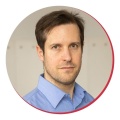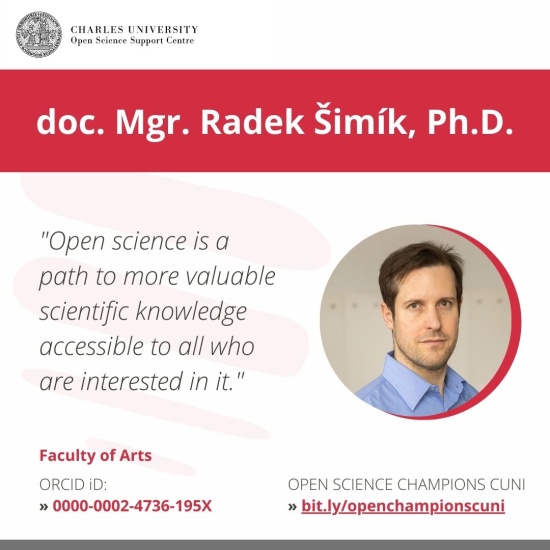 Institute of Czech Language and Theory of Communication, Faculty of Arts
Institute of Czech Language and Theory of Communication, Faculty of Arts
ORCID: 0000-0002-4736-195X
ResearcherID: AAM-2696-2020
Twitter: @radek_simik
OSF: https://osf.io/bw4tc
I first heard about the open science initiative, or more specifically open access publishing, during my PhD studies (around 2007) from a librarian in Groningen, Netherlands. Nevertheless, I had already been using linguistic repositories for some time, in particular LingBuzz and SemanticsArchive, as a part of what we now call green open access. With great interest, I followed the emergence of linguistic platinum open access journals (e.g., Biolinguistics or Semantics and Pragmatics; both from 2007). A major event in the world of general linguistics was the departure of the editorial team of the journal Lingua from the Elsevier publishing house, which was unwilling to accept a fair open access model. In 2016, the editorial staff responded by founding the gold-platinum journal Glossa, which, thanks to the collective movement of the entire general linguistics community during five years, managed to develop into the 16th most influential linguistics journal during five years (according to Google Scholar metrics). In 2012, I became one of the many supporters of the nascent open access book publishing house Language Science Press, which during approximately eight years of its existence has published over 200 books using the platinum open access model. In 2017, I was one of the co-founders of the book series Open Slavic Linguistics as a part of this publishing house, in which seven books have been published so far. In approximately the last five years, I have become interested in other aspects of open science, especially pre-registration, sharing of research data and analyses, but also, for example, open peer-review.
Today, open science permeates most of my work. I share preprints in subject specific repositories. If possible, I publish in open access mode – either platinum or with the support of grant agencies via gold open access. I continue to work actively as an editor of the Open Slavic Linguistics series, and currently also as a guest editor at the above-mentioned journal Glossa. Empirical research is usually accompanied by a pre-registration and the subsequent sharing of research data, for which I usually use the platform Open Science Framework. I try to guide my colleagues and students to the same practice.
Science is a global discourse, and the more open it becomes, the better it works. Open access to publications, but also to research plans (pre-registration), materials, results, or analyses allows for better supervision of scientific activities and thus naturally leads to better science. Thanks to open science, people and institutions who would otherwise be cut off from new scientific knowledge because they cannot afford to spend exorbitant amounts of money on subscriptions to journals can participate in scientific discourse. Thus, open science is inclusive in principle and is an important factor in gradually bridging the gap between rich and developing countries.
First of all, I would definitely recommend that they contact the Open Science Support Centre at Charles University. In addition, I would encourage them to publish their results in open access journals or books, even at the cost of smaller formal impact. They should not forget to apply for funds for open access publications when applying for grants. Finally, I would encourage them not to be discouraged by the greater amount of work involved in publishing research data. It is an investment that can pay off in various forms.
What I consider a major obstacle is the continuing dependence of the scientific community on large publishing houses, whose primary interest is not quality science but the highest possible margins from subscription sales and, more recently, profit from gold open access fees. I see gold open access, currently offered by most journals, as a temporary solution. The opportunities of open publishing should be available to everyone without distinction, not only to those who have the money to pay for it. Countries and institutions should thus work intensively on a fairer open access strategy. At the European level, I follow with interest the developments surrounding Plan S.
Open science is a path to more valuable scientific knowledge accessible to all who are interested in it.

Residency, Invoicing and Correspondence Address
Charles University
Central Library
Ovocný trh 560/5
116 36 Prague 1
Czech Republic
Office Address
José Martího 2 (2nd floor)
160 00 Prague 6
Phone: +420 224 491 839, 172
E-mail: openscience@cuni.cz
Www: openscience.cuni.cz